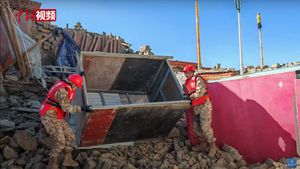JAKARTA - Russia's COVID-19 cases hit 9 million on Saturday with the government setting a target to achieve herd immunity by June 1, 2022.
Citing TASS November 13, Russia recorded 39,256 confirmed cases of COVID-19 infection in the past 24 hours, bringing the number of cases of COVID-19 infection in the country to 9,031,851 since the start of the pandemic, with a growth rate of 0.44 percent, the epicenter of the anti-corruption crisis. coronavirus told reporters on Saturday.
In less than a month, the number of cases of COVID-10 infection increased by one million, on October 18, the number of infected exceeded 8 million. Specifically, over the past 24 hours, 3,273 cases were registered in St. Petersburg, 2,891 cases in the Moscow region, 1,790 cases in the Samara region, 837 cases in the Republic of Crimea, 788 cases in the Nizhny Novgorod region.
The number of patients being treated has now increased to 1,022,920. In addition, Russia recorded 1,241 deaths from the coronavirus in the last 24 hours, down from 1,235 the day before. The total death toll from COVID-19 reached 254,167.
Meanwhile, the number of COVID-19 patients who recovered in the last 24 hours stood at 33,802 to 7,754,764 in the last 24 hours. According to data from the crisis center, 85.9% of coronavirus patients have recovered in Russia.
Separately, QR codes are expected to remain valid in Russia until June 1, 2022, before that date is planned to achieve herd immunity against infection with the new coronavirus, says Russian Deputy Prime Minister Tatiana Golikova.
"The bill has a fixed grace period, until June 1, 2022. Why June 1, 2022? Because we hope that on this date herd immunity can reach 80 percent of the adult population," he said.
Earlier in the day, the government submitted to the State Duma, or lower parliament building, a proposal on the use of QR codes in transportation and in public places.
The measure is valid until June 1, 2022 and will not apply to pharmacies, food stores and trade outlets selling daily necessities. The final decision on the use of QR codes and a list of places requiring them will be left to the regional authorities.
The English, Chinese, Japanese, Arabic, and French versions are automatically generated by the AI. So there may still be inaccuracies in translating, please always see Indonesian as our main language. (system supported by DigitalSiber.id)













